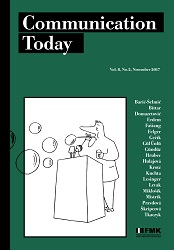MEN’S EVALUATION OF “HEGEMONIC MASCULINITY” ROLES IN TURKISH TELEVISION ADVERTISEMENTS PORTRAYING MEN
MEN’S EVALUATION OF “HEGEMONIC MASCULINITY” ROLES IN TURKISH TELEVISION ADVERTISEMENTS PORTRAYING MEN
Author(s): Derya Gül ÜnlüSubject(s): Social Sciences, Gender Studies, Psychology, Media studies, Sociology, Sociology of Culture, Ethnic Minorities Studies
Published by: Univerzita sv. Cyrila a Metoda v Trnave, Fakulta masmediálnej komunikácie
Keywords: gender; hegemonic masculinity; social relations; social structure; television advertisements;
Summary/Abstract: Television advertisements are one of the most important areas in which gender roles that are considered ‘suitable’ for women and men provide a continuation of gender relations. In addition to problematic representations of women in television advertisements, it is possible to see gender roles of men, whose characters are reflected in a way that reinforces gender relations. Considering the current scholarly opinions on this matter, we describe the dominant role of men by the concept of “hegemonic masculinity”. Conceptualisation of “hegemonic masculinity” represents the dominance of men within gender relations over both women and ‘other’ men. From this point of view, the study aims to reveal opinions of males about hegemonic masculinity representations included in advertisements and their views on the reality of this problematic representation. In this context, first of all we reflect on Connell’s conceptualisation of “hegemonic masculinity” and thus we refer to the forms of representation of hegemonic masculinity roles used in television advertisements. After that, we present results of in-depth interviews, conducted via semi-structured interview scheme with 20 men, regarding the roles of “hegemonic masculinity” in television advertisements. The research reveals the opinions of men who are from different educational backgrounds, of different ages and professions. Pointing out the results of the empirical study, we determine that male television viewers in Turkey are aware of the fact that men are featured in advertisements mostly through their bodies; the role of women is shown in terms of domestic relations. Men do not have to make decisions on domestic matters, women are preferred in relation to purchasing decisions, and roles of women are more effective in emotional relations. Moreover, the results suggest that in Turkish television advertisements, group relations between men are not based on hierarchy.
Journal: Communication Today
- Issue Year: 8/2017
- Issue No: 2
- Page Range: 112-133
- Page Count: 22
- Language: English

